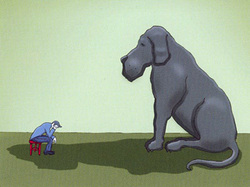No one can see the Black Dog except you. Depression and anxiety are like that . Invisible. Which is why it feels so lonely. If you have a cough or a limp, someone will notice and commiserate . But if you are depressed - and you’re not sitting in a corner sucking your thumb or plucking the fluff off your jumper - no one notices.
If you are anxious you can look pretty normal - unless you've staggered into A & E with full-blown symptoms of a heart attack.
 Image from I Had a Black Dog by Matthew Johnstone
Image from I Had a Black Dog by Matthew Johnstone The Black Dog, which has been nipping at my heels for quite a while, suddenly took me in his jaws and dragged me into his kennel. It’s a great slavering lunk of a thing, all drool and droopy blood-shot eyes. His kennel is full of half-gnawed bones and is very dark: the dog’s lugubrious bulk blocks any light that might otherwise shine in through the door.
And if that’s not enough, there’s a Black Cat in here too. It’s a skinny, malevolent-looking creature and it has insinuated itself around my neck, resting its desiccated muzzle with the yellow eyes on one of my shoulders, and dangling its paws and tail over the other.
My grandmother had a fox-fur stole just like it, but at least it was dead. This cat is very much alive. It emits a constant sinister purr and sheds so much fur it’s difficult to breathe. No one can see the Dog or the Cat except me.
C. S. Lewis describes how grief over the death of his wife created an “invisible blanket between the world and me”. It’s lonely on the other side of the blanket but you dread the moment when the internal turmoil might become visible on the outside: who wants to be thought of as a miserable, loopy, over-sensitive cot-case?
As Andrew Solomon, points out in Noonday Demon - a curiously uplifting book about depression - an anxious or depressed person knows that it is “ludicrous to feel so disabled by the ordinary business of quotidian life”. While he was suffering depression, he was furious with himself “because I knew that what I was experiencing was idiotic. It was nonetheless vivid and physical and acute, and I was helpless in its grip”.
Everyone’s unique. I'm unique. You are unique. So is the Prime Minister, heaven help us. The kid I remember from primary school who could knock back a half-pint of school milk and then squirt it out of his nostrils . . . he was unique. Given all this singularity, it’s no wonder that depression and anxiety take so many different forms. For Andrew Solomon, anxiety was “the constant feeling of being terrified and not knowing what you're afraid of”. In Darkness Visible, his memoir about depression, novelist William Styron likened it to “drowning or suffocation”. For his friend Romain Gary, depression was “the colour of verdigris”.
When I‘m anxious, it feels as if someone has installed an alarm clock in my chest and rigged it so that the alarm goes off, very very loudly, at purely random intervals. The clock’s constant implacable ticking is unpleasant enough, but it’s the sudden shrilling alarm that’s really unnerving. It puts me into instant panic mode. My stream of consciousness suddenly becomes a teeming tsunami which makes it difficult to think straight.
What is the remedy? There’s no cure-all for the many varieties of anxiety and depression, but some things definitely ameliorate the misery. For me this week, it was a friend who lent a thoughtful and compassionate ear, a hand-written note in my letterbox, a movie in which the actors looked even more haggard than I felt, and reading a book which made me laugh.
The book, No! I Don’t Want to Join a Book Club! by Virginia Ironside, should be required reading for baby-boomer book clubs everywhere. Viewing the world through the eyes of a cynical 60-year-old, Ironside writes with disarming and hilarious frankness. There’s something very wonderful about having someone admit to disgraceful behaviours, foolish agonies over trivial matters and thoughts you’ve never uttered except in echo chamber of your own mind. Authenticity, in whatever form it takes, is always a gift, freeing both the giver and the receiver. And laughing out loud - which I did while reading this book - reminds you that the world can call you back.
| Leonard Cohen’s poetry and songs are informed by his life-long battle with depression - what he calls “a kind of angst of the heart and of the spirit”. The songs he’s written out of that misery aren’t miserable, they offer hope . . . “Ring the bells that still can ring” he sings in Anthem, “Forget your perfect offering/There is a crack, a crack in everything/That's how the light gets in”. | |
And that in the coming weeks, the Black Dog and the Black Cat and I will find some happier accommodation.
 RSS Feed
RSS Feed

